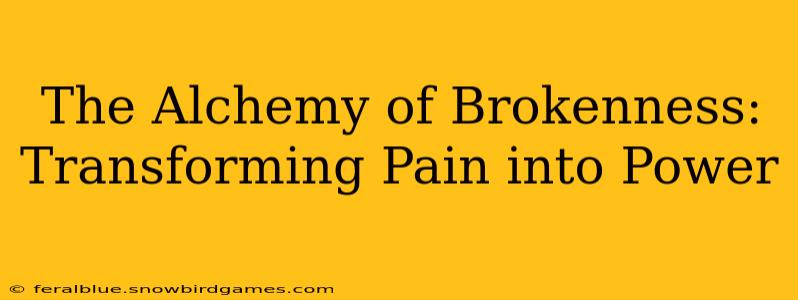Life inevitably throws curveballs. Heartbreak, loss, failure – these experiences, while painful, are not the end of the story. They are, in fact, potent catalysts for growth, offering an opportunity for profound transformation. This journey, the alchemy of brokenness, is about taking the raw materials of pain and forging them into the strength and resilience that empowers us to live more authentically and fully. This isn't about ignoring or suppressing pain, but rather about understanding its transformative potential.
What is the Alchemy of Brokenness?
The "alchemy" in this context refers to the transformative process, the ability to take something seemingly negative – pain, suffering, setbacks – and turn it into something positive – wisdom, resilience, and strength. It's not a magical process, but rather a conscious and deliberate journey of self-discovery and growth. It involves confronting our pain head-on, processing our emotions, and extracting valuable lessons from our experiences. This process allows us to rebuild ourselves, stronger and wiser than before.
How Can Pain Be Transformed into Power?
This transformation isn't a quick fix; it's a process that requires time, self-compassion, and a willingness to engage with our inner world. Here are some key steps in this alchemy:
1. Acknowledge and Validate Your Pain:
The first step is acknowledging the pain. Suppressing or ignoring it will only prolong the healing process. Allow yourself to feel the emotions fully, without judgment. Journaling, talking to a trusted friend or therapist, or engaging in creative expression can help you process your emotions healthily.
2. Find Meaning in Your Suffering:
This is often the most challenging step. Finding meaning doesn't mean justifying the pain; it's about identifying the lessons learned and the personal growth that has occurred as a result. Ask yourself: What have I learned from this experience? How has it changed me? What strengths have emerged?
3. Cultivate Self-Compassion:
Be kind to yourself during this process. Healing takes time, and setbacks are inevitable. Practice self-compassion by treating yourself with the same understanding and kindness you would offer a friend going through a similar experience.
4. Reframe Your Perspective:
Reframing involves changing how you view your experience. Instead of focusing on the negative aspects, try to identify the positive outcomes, even if they're small. This shift in perspective can significantly impact your emotional well-being.
5. Take Action:
Healing is not passive. Take proactive steps to rebuild your life. Set goals, make plans, and take action, however small, towards a brighter future.
How Long Does it Take to Transform Pain into Power?
There's no set timeline for this transformative process. It varies greatly depending on the nature and severity of the pain, individual coping mechanisms, and access to support systems. Some individuals may find healing relatively quickly, while others may require more time and support. Patience, self-compassion, and consistent effort are key.
What are Some Examples of Transforming Pain into Power?
Many individuals have demonstrated the power of transforming pain into positive change. Think of athletes overcoming injuries to achieve greatness, artists expressing their trauma through their work, or activists fighting for social justice after experiencing personal hardship. Their stories are testaments to the resilience of the human spirit and the potential for growth even in the face of adversity.
Can Everyone Transform Pain into Power?
Yes, everyone has the capacity to transform pain into power. While the process may be challenging, with self-awareness, support, and consistent effort, individuals can navigate their pain and emerge stronger and more resilient. However, seeking professional help from a therapist or counselor can be invaluable during this journey, particularly when dealing with significant trauma or prolonged suffering. Remember, seeking help is a sign of strength, not weakness.
This journey of transforming pain into power is a testament to human resilience and the capacity for growth. Embracing the alchemy of brokenness is not about erasing the past but about learning from it, growing from it, and ultimately, becoming a stronger, more compassionate, and more empowered version of ourselves.

